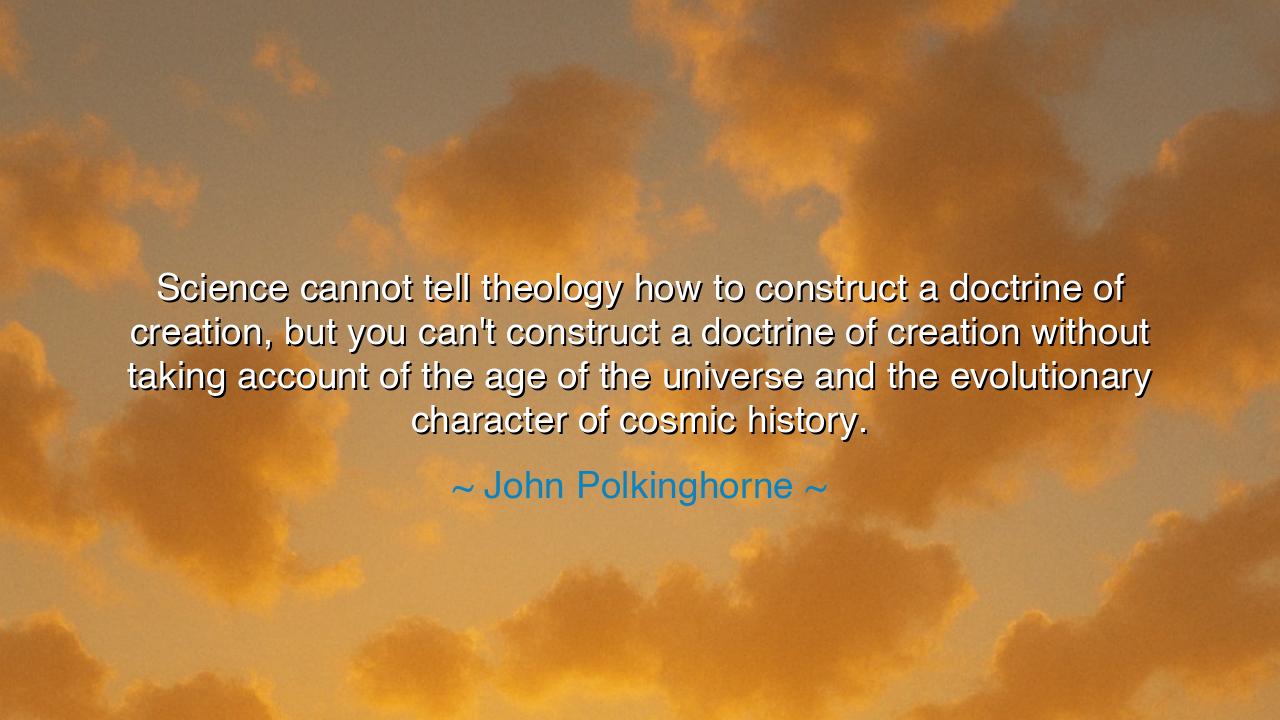
Science cannot tell theology how to construct a doctrine of
Science cannot tell theology how to construct a doctrine of creation, but you can't construct a doctrine of creation without taking account of the age of the universe and the evolutionary character of cosmic history.






In an age when faith and reason so often stand as rivals, John Polkinghorne, both priest and physicist, spoke with the wisdom of one who had lived in both worlds: “Science cannot tell theology how to construct a doctrine of creation, but you can't construct a doctrine of creation without taking account of the age of the universe and the evolutionary character of cosmic history.” These words are not a challenge, but a bridge. They call for harmony between the mystery of belief and the precision of knowledge, between the poet’s awe and the scientist’s clarity. In them lies the timeless truth that truth itself is one, though its languages are many — that the heavens declare glory through equations as well as psalms.
To understand Polkinghorne’s meaning, we must see that he was a man of both science and spirit — a physicist who once probed the smallest particles of the universe and later sought the infinite within the heart of God. He understood that science and theology are not enemies, but companions walking different paths toward the same summit of understanding. When he says that science cannot tell theology how to construct its doctrine, he affirms that the sacred cannot be reduced to mere data; the divine transcends the limits of experiment. Yet when he adds that theology must take account of the age of the universe and the evolutionary character of cosmic history, he reminds us that revelation and reason must not live in separate worlds. To speak of creation while ignoring the cosmos is to close one’s eyes while proclaiming sight.
In the ancient days, there was a man named Galileo Galilei, who looked through a telescope and saw that the earth was not the center of creation. For this, he faced the wrath of those who feared that heaven’s mysteries were being diminished by human curiosity. Yet history proved otherwise. The discovery did not diminish God; it expanded the majesty of creation itself. Polkinghorne’s wisdom flows from the same spring: that the findings of science do not rob faith of meaning, but enrich it. When theology listens to the stars and the atoms, it does not lose holiness — it gains humility and wonder.
To take account of cosmic history is to recognize that creation is not a single event frozen in time, but an unfolding drama of billions of years — a story written in light and gravity, in life and death, in the birth of stars and the evolution of minds. It is to see that the divine act of creation may not be a single word spoken once, but a continual song, still being sung across the vast expanse of time. In this understanding, the universe itself becomes sacred scripture — a text written not in ink, but in energy and matter, whose verses are galaxies, whose chorus is life.
And yet, Polkinghorne does not let science rule over theology, nor theology dismiss science. He calls for integration, not dominance. He reminds us that while science tells us how the universe unfolds, theology seeks to answer why. Science measures the tempo of creation; faith seeks its meaning. The physicist observes the explosion of stars; the mystic sees the breath of God. One without the other is incomplete — for to know without wonder is empty, and to wonder without knowledge is blind.
We see this balance in the life of Albert Einstein, who, though not a theologian, spoke of the “cosmic religious feeling” that science awakens — the awe one feels before the intelligibility and beauty of the universe. He said, “Science without religion is lame; religion without science is blind.” Polkinghorne’s quote stands in this same lineage of wisdom. He invites the seeker to embrace both the intellect and the spirit — to let them dance rather than duel. The evolutionary story of creation is not a threat to faith but a deeper revelation of the divine artistry that shapes all things.
So, O student of both light and mystery, let this be your lesson: do not divide what the truth has joined. Seek knowledge with reverence, and worship with understanding. Let your faith be deep enough to face the facts of the universe, and your reason humble enough to kneel before what it cannot explain. The cosmos is ancient, yet still being born; the Creator is timeless, yet still creating through every heartbeat, every sunrise, every new discovery of the mind.
Thus, the teaching endures: Science cannot command faith, and faith must not ignore science. Together they weave the full tapestry of truth. To honor both is to live wisely — to look upon the universe with eyes open and heart aflame, and to whisper with awe, as Polkinghorne surely did, “This too is the work of God.”






AAdministratorAdministrator
Welcome, honored guests. Please leave a comment, we will respond soon